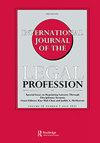New Zealand lawyers and conveyancers disciplinary tribunal cases involving vulnerable clients, 2011–2017*
IF 0.9
Q2 LAW
International Journal of the Legal Profession
Pub Date : 2018-11-15
DOI:10.1080/09695958.2018.1543119
引用次数: 1
Abstract
ABSTRACT This research analyses disciplinary decisions of the New Zealand Lawyers and Conveyancers Disciplinary Tribunal (NZLCDT) from 2011 to 2017 that involve vulnerable clients. Increasingly, scholarship discusses vulnerability as an ethical concept, including in the legal context. Based on published decisions, the present study inquires whether some legal clients’ vulnerability warrants special attention. Twenty-five of the 193 clients in the NZLCDT decisions qualified as vulnerable based upon age, gender, mental health/neuro-disability or immigrant status. The results may inform disciplinary bodies and inspire preventive strategies by lawyers, educators and regulatory bodies. Ultimately, this evidence-based analysis magnifies the importance of client-centred approaches to risk reduction in legal practice.2011-2017年新西兰律师和财产转移人涉及弱势客户的纪律法庭案件*
摘要本研究分析了新西兰律师和财产转让人纪律法庭(NZLCDT)2011年至2017年涉及弱势客户的纪律裁决。学术界越来越多地将脆弱性作为一个伦理概念来讨论,包括在法律背景下。根据已公布的决定,本研究询问一些法律客户的脆弱性是否值得特别关注。根据年龄、性别、心理健康/神经残疾或移民身份,NZLCDT决策中的193名客户中有25名符合弱势群体资格。研究结果可能会为纪律机构提供信息,并启发律师、教育工作者和监管机构制定预防策略。最终,这种基于证据的分析放大了以客户为中心的方法在法律实践中降低风险的重要性。
本文章由计算机程序翻译,如有差异,请以英文原文为准。
求助全文
约1分钟内获得全文
求助全文

 求助内容:
求助内容: 应助结果提醒方式:
应助结果提醒方式:


